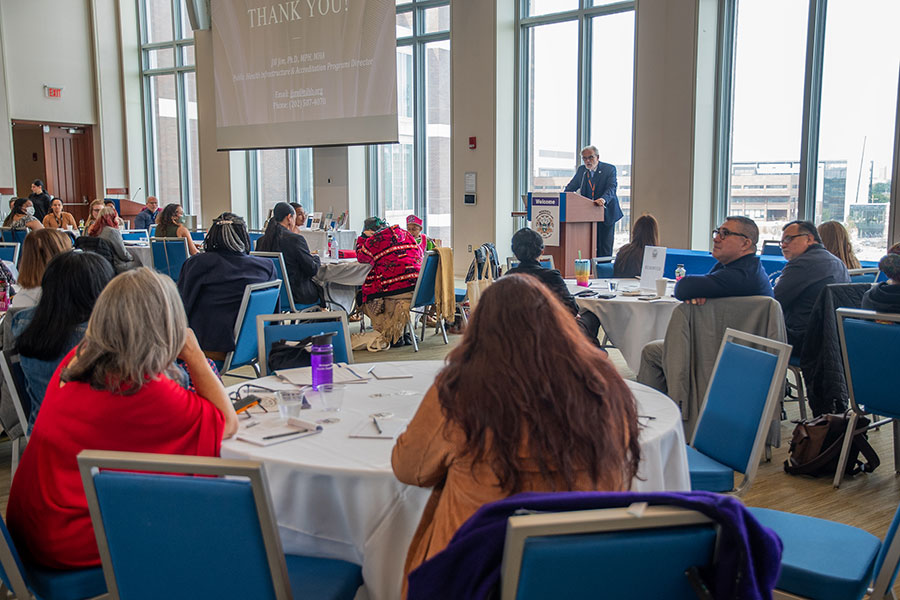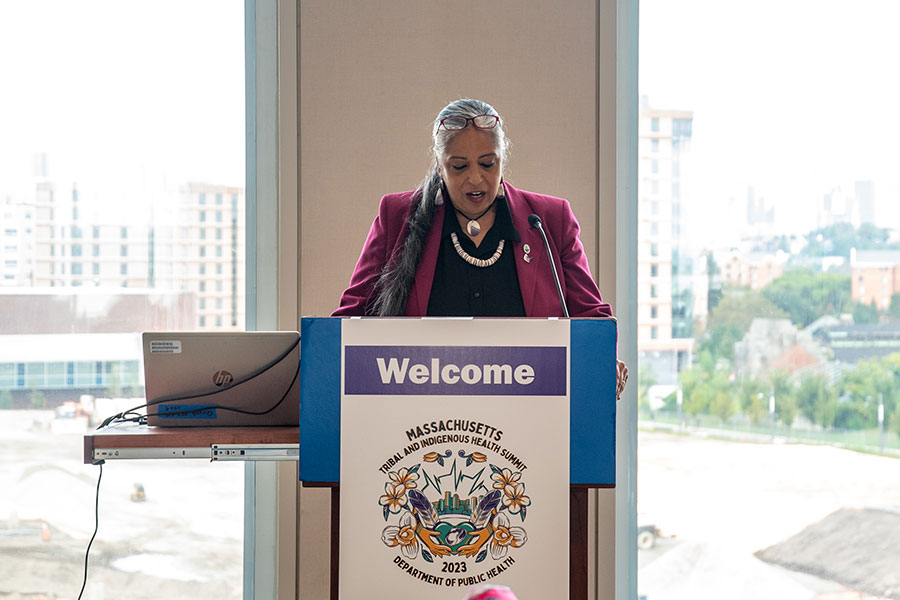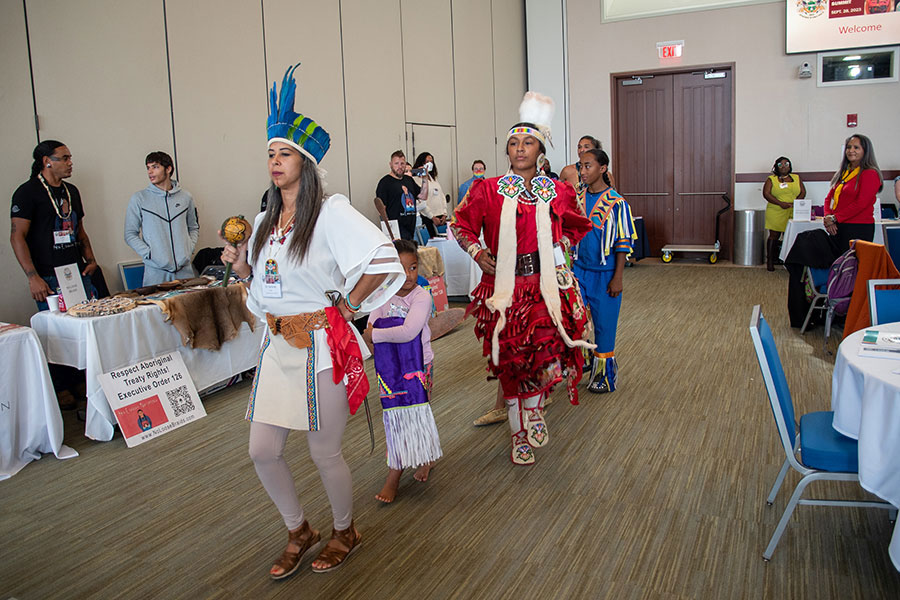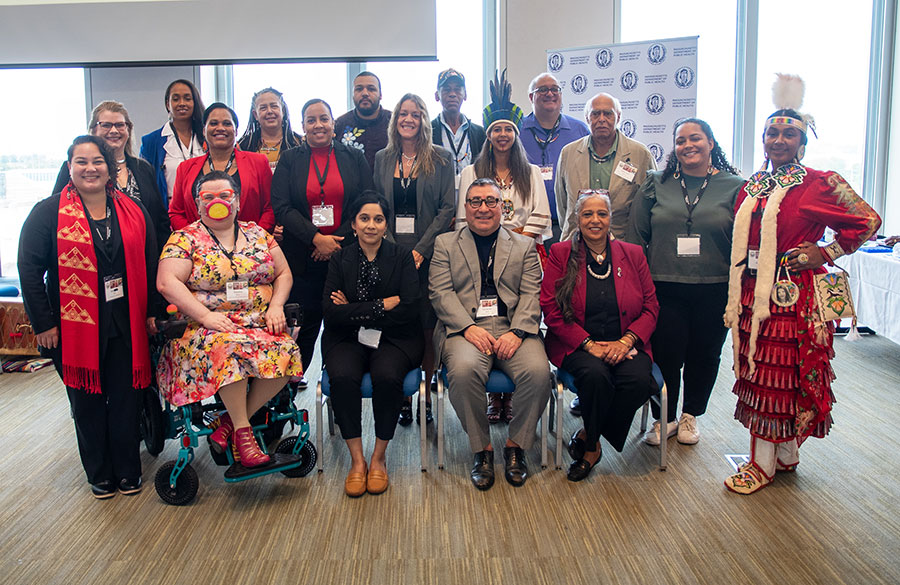- Home
- News
- Recent News
- Tribal Leaders Gather for Health Summit
Chancellor, State Health Officials, Tribal Leaders Gather for Tribal and Indigenous Health Summit
Dozens of Tribal and Indigenous leaders, health advocates, and regional, state, and local representatives from across New England came together last week at UMass Boston for the inaugural Massachusetts Tribal and Indigenous Health Summit.

Led by the Department of Public Health, the summit offered a critical opportunity to build stronger partnerships among the state and Tribal and Indigenous communities so they can work collaboratively to come up with real, innovative solutions to Native health issues.
Speakers covered many facets of health in Tribal and Indigenous communities—mental health, the COVID-19 response, public health data, substance abuse prevention, treatment, recovery and harm reduction. Attendees also learned about colonialism’s devastating impact on Native health.
"Our strength, courage, and resiliency, we’re here today to make positive changes in our Tribal communities’ health. As we sit here today, we’re at the beginning of a long road to heal,” said keynote speaker Chairwoman Cheryl Andrew-Maltais of the Aquinnah Wampanoag Tribe of Gay Head. “By working together, we can build a better healthcare system for our people.”

“By listening to us and our traditional cultural knowledge and incorporating our traditional medicinal practices, we can develop effective means to have a better healthcare outcomes for our peoples. By providing us with the resources that we need, we can show you how we can be healthy and self-sufficient once again.”
Chancellor Marcelo Suárez-Orozco told attendees that while health has improved over the decades, as we’ve taken on infectious diseases, increased health care access, and managed chronic conditions across all racial groups—we still need to do better.
“By any measure, health care for Native American and Indigenous communities lags over other groups. Native American and Indigenous communities face inequities,” Suárez-Orozco said. “We must consider health disparities as a wicked problem. We need to understand the science, we need to understand the social determinants, we need to understand the structural racism and inequities that now have invaded nearly every domain of the economy and society. In this country and in so many other places around the world, nobody knows better over the last 500 years than our Native and Indigenous communities what is at stake with these systems of inequality.”
Department of Public Health Commissioner Robert Goldstein applauded the “intentional groundwork and trust building that has taken place over the last ten years to get us to this point, this day, this first of its kind summit.”
“We all know there’s more work to do. At DPH we deliberately and intentionally focus our public health work on equity,” he said. “Today is just the start. Continue learning, continue growing, continue networking and collaborating, and let us know how we can support tribes in and tribal serving organizations better.”
DPH Tribal Indigenous Health Equity Strategist Cheryl Cromwell, a member of the Mashpee Wampanoag, emceed the event. She called the summit “a new beginning of much needed partnerships” happening here in Massachusetts.
John Jim Peters, of the Massachusetts Commission on Indian Affairs and Mashpee Wampanoag, spoke of how Native life expectancy, not long ago, was just 50 years of age; many Native people had to take on domestic labor and construction jobs that offered no health benefits in order to support their families.
“It really struck me to think about that,” he said. “I’m very thankful for these efforts of people coming together and starting to pay some attention to our health needs and doing something after so many years we were underrepresented.”

The summit began with a Tribal land acknowledgement, prayer, song, and dance. Elizabeth Solomon, a Massachusett at Ponkapoag elder, gave the land acknowledgement, and Chairman Brian Weeden of the Mashpee Wampanoag Tribe said the prayer.
Summit attendees were also treated to a lunch catered by James Beard Award-winning Chef Sherry Pocknett’s Sly Fox Den Too restaurant. Pocknett cooks Indigenous cuisine from her Wampanoag culture at her Charlestown, Rhode Island restaurant.
Breakout sessions focused on how to appropriately collect, analyze, and disseminate Tribal data back to the Tribes and Tribal public health authorities; mental health and behavioral health and identifying the impact of historical trauma on the generations past and present; and an overview of the many aspects of substance use in Tribal and Indigenous communities, identifying challenges and highlights of prevention, treatment, and recovery efforts.
Tribal students pursuing their doctorate degrees at UMass Medical School spoke to participants about their pathways to deciding and becoming Tribal health professionals and what that will mean to the Tribal and Indigenous communities they represent.
Attendees also heard from representatives from the Indian Health Service, Native American Lifelines Urban Health, and Tribal and Indigenous, People Serving Organizations. Dr. Jill Jim, who served on the National Indian Health Board and President Biden’s COVID Task Force, spoke about the response to COVID-19 in Indian Country.
The summit was sponsored by UMass Boston, the Massachusetts Department of Public Health, Bureau of Substance Addiction Services and the Community Engagement Unit of the Office of Health Equity, Tufts University, UMass Medical School, Native American Lifelines Inc., AdCare Educational Institute, Inc., and the UMass Boston – Dana-Farber/Harvard Cancer Center (DF/HCC) Partnership. Cedric Woods, director of UMass Boston’s Institute for New England Native American Studies (INENAS), served on the planning committee.

Chancellor Suárez-Orozco said he believes that the university and INENAS’s partnerships with the tribes, state government, and community organizations, together with our endeavors as an anti-racist health promoting university, offers a promising pathway to move forward.
“I can't tell you how important it is for us to be together, all together in one room to be able to understand and share the wisdom that we all have and we all should be sharing in order to provide better health care options for all of us,” Andrew-Maltais said.
